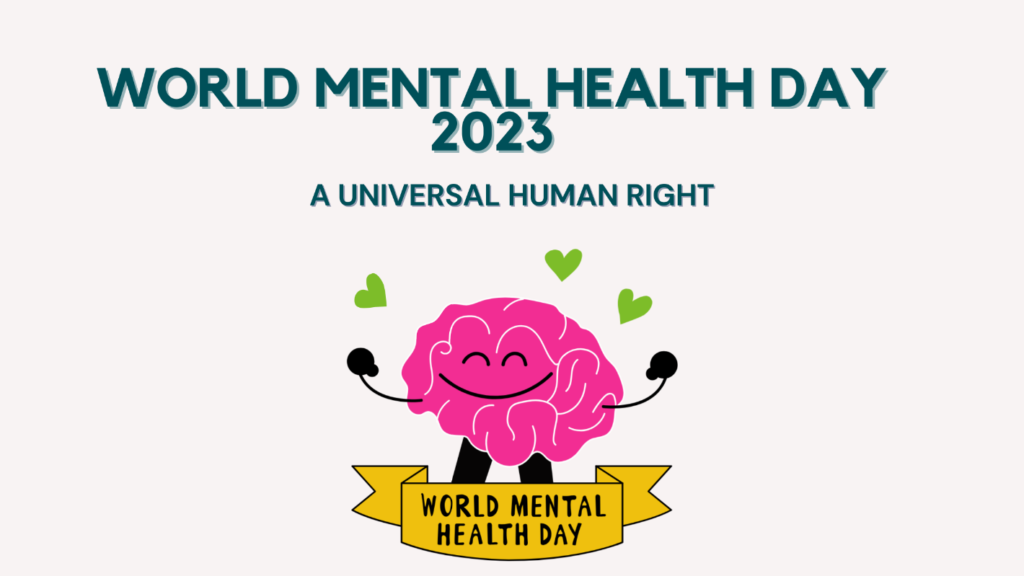
THE ROLE OF EDUCATIONAL INSTITUTIONS IN PROMOTING MENTAL HEALTH RIGHTS.
Every person’s mind is wonderful, complex, and different. But our rights are the same.
– World Health Organization (WHO)
Mental health is a state of overall well-being of an individual which is not only the mere absence of mental disorders but the presence of a positive state of mental and emotional well-being. This definition aligns well with the broader understanding of human rights, focusing not only on protection from harm but also on the freedom to lead a satisfying and purposeful life. This means that everyone has the right to be shielded from mental health dangers, the right to get good quality care that is easy to access and acceptable, and the right to live with freedom and inclusion in their community.
The World Federation for Mental Health established World Mental Health Day in 1992 and has since become a pivotal event in the global mental health calendar. Every year, this day serves as a reminder of the immense impact mental health has on our lives and the lives of those around us. It is a day dedicated to breaking the stigma surrounding mental health and encouraging open conversations about it. This is a reminder that everyone in the globe, regardless of geographic boundaries or culture must focus their collective attention on a problem that affects us all.
In 2023, the theme for World Mental Health Day is “Mental Health is a Universal Human Right.” The theme reflects a fundamental truth that should be self-evident but has often been overlooked in the past.
It emphasizes that the right to mental well-being is not a privilege reserved for a select few but a basic human right that should be accessible to all, irrespective of their background, circumstances, or beliefs.
The Role of Education and Educational Institutions in Promoting Mental Health Rights
Educational institutions serve as a primary source of knowledge and information. They have a profound role to play in advancing the cause of mental health as a human right.
- Around 10% of school-going children in India suffer from mental health issues as per the survey conducted by the National Sample Survey Organization.
- Globally, approximately 13% of individuals under the age of 18 are estimated to face significant mental health issues.
This alarming statistic highlights the widespread nature of mental health challenges among young people across various countries and cultures, emphasizing the urgent need for effective measures to prioritize and address the mental well-being of the youth population on a global scale.
Here are several ways they can contribute to this important effort:
- Incorporate Mental Health Education into the Curriculum:
Include mental health topics in the curriculum to raise awareness and educate students about the common mental health issues, and coping strategies.
- Supportive Campus Culture:
Establish a culture of empathy and support by encouraging open conversations about mental health. Organize awareness campaigns, events, and workshops to reduce stigma.
Train faculty, staff, and student leaders in recognizing signs of mental distress and providing support.
- Provide Access to Resources:
Appoint mental health professionals like psychologists, counselors, and social workers who work closely with students, offering individual and group counseling sessions. These professionals play a crucial role in helping students navigate challenges such as academic stress, peer pressure, and personal issues.
- Mental Health First Aid Training:
Equip staff and student leaders with this training as it provides individuals with the knowledge and practical skills needed to support those facing mental health challenges, offering a crucial lifeline during difficult times.
- Peer Support Programs:
Develop peer support networks or mentorship programs where experienced students can guide and support their peers. Encourage students to look out for one another and reach out when they notice a friend in distress.
- Promote Work-Life Balance:
By implementing policies and practices that encourage a healthy balance between academic responsibilities and personal life for both students and staff, schools can create a more supportive and sustainable atmosphere.
By integrating mental health education, raising awareness, and fostering supportive environments, where students, faculty, and staff feel comfortable discussing mental health concerns without fear of discrimination or judgment, educational institutions can contribute to breaking down the barriers associated with mental health issues in the society overall.
Ways to Strengthen Mental Health as a Universal Human Right in Society:
- Attitudinal Change: To combat the stigma around mental health, attitudinal change is not only important; it’s necessary. It can also drive changes in policy and healthcare systems, leading to better mental health services, more funding, and improved resources for those in need.
- Affordable and Accessible Mental Health Services: Adequate services are available to all, regardless of their financial status. This includes appropriate insurance coverage and mental health facilities in both urban and rural areas.
- Incorporate Mental Health into Healthcare: Integrate mental health into primary healthcare services, ensuring that mental health is given the same priority as physical health. This includes routine mental health screenings during general check-ups.
- Employment Rights: Advocate for fair employment rights, which include accommodations for individuals with mental health conditions, the right to sick leave for mental health issues, and protections against workplace discrimination.
- Media Responsibility: Encourage responsible reporting on mental health issues in the media to reduce stigmatization and provide accurate information.
Promoting understanding and empathy and acknowledging that mental health challenges are common and not a sign of weakness, each individual and together as a society, must advocate for policies and programs that expand access to mental health care. Thus, creating safe and supportive environments where individuals with mental health issues feel valued and included.
Interview By – DEEBHA SITHTA

